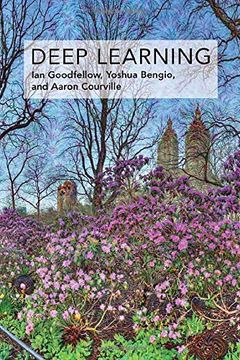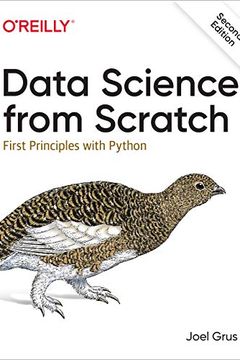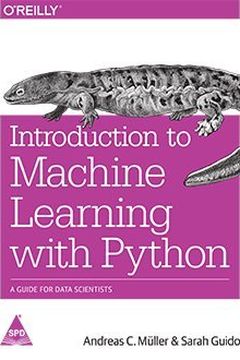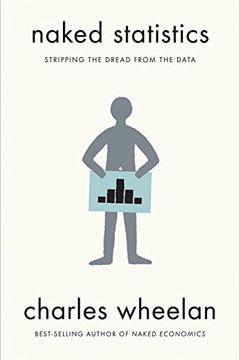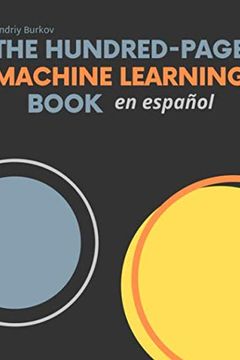Los mejores libros de ciencia de datos
Buscamos en internet cada libro sobre ciencia de datos, compilamos una lista y los clasificamos según la cantidad de veces que aparecieron. Cada uno de los libros de esta lista fue mencionado en al menos dos de los artículos.

100 libros en la lista
Ordenar por
Cantidad de artículos
Diseño
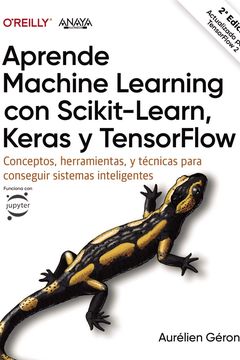
Aprende Machine Learning con Scikit-Learn, Keras y TensorFlow
Conceptos, herramientas y técnicas para construir sistemas inteligentes
A series of Deep Learning breakthroughs have boosted the whole field of machine learning over the last decade. Now that machine learning is thriving, even programmers who know close to nothing about this technology can use simple, efficient tools to implement programs capable of learning from data. This practical book shows you how.
By using concrete examples, minimal theory, and two production-ready Python frameworks—Scikit-Learn and TensorFlow—author Aurélien Géron helps you gain an intuitive understanding of the concepts and tools for building intelligent systems. You’ll learn how to use a range of techniques, starting with simple Linear Regression and progressing to Deep Neural Networks. If you have some programming experience and you’re ready to code a machine learning project, this guide is for you.
This hands-on book shows you how to use:
Scikit-Learn, an accessible framework that implements many algorithms efficiently and serves as a great machine learning entry point
TensorFlow, a more complex library for distributed numerical computation, ideal for training and running very large neural networks
Practical code examples that you can apply without learning excessive machine learning theory or algorithm details
Presentado en 35 artículos
This book explores the fascinating world of deep learning, which teaches computers to understand the world through a hierarchy of concepts. It covers mathematical and conceptual background, techniques used in industry, and research perspectives. Readers will learn about relevant topics in linear algebra, probability theory, and more, as well as practical applications in areas like natural language processing and computer vision. Perfect for students or engineers looking to incorporate deep learning into their work. Supplementary material available on the website.
Presentado en 34 artículos
This updated book on data science teaches you the tools, algorithms, and principles underlying data science. With a focus on Python 3.6, author Joel Grus shows you how to implement these tools from scratch. Whether you have a background in programming or mathematics, this book will help you master the fundamentals of data science such as statistics, probability, and machine learning. The book also covers newer topics like deep learning and natural language processing. With practical examples and exercises, you'll be able to clean, manipulate, and analyze data, and implement models like neural networks and decision trees.
Presentado en 27 artículos
Recomendado por
Thorsten Heller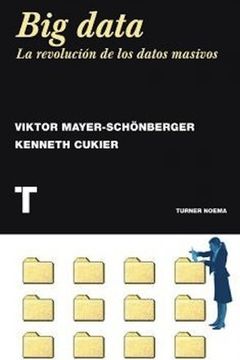
Big data, la revolución de los datos masivos
A Revolution That Will Transform How We Live, Work, and Think
Un análisis esclarecedor sobre uno de los grandes temas de nuestro tiempo, y sobre el inmenso impacto que tendrá en la economía, la ciencia y la sociedad en general. Los datos masivos representan una revolución que ya está cambiando la forma de hacer negocios, la sanidad, la política, la educación y la innovación.
Dos grandes expertos en la materia analizan qué son los datos masivos, cómo nos pueden cambiar la vida, y qué podemos hacer para defendernos de sus riesgos.
Un gran ensayo, único en español, pionero en su campo, y que se adelanta a una tendencia que crece a un ritmo frenético.
Presentado en 27 artículos
Learn practical ways to build your own machine learning solutions using Python with this book! Perfect for beginners, authors Andreas Müller and Sarah Guido will guide you through the process of creating successful machine-learning applications with the scikit-learn library. You'll discover how to use machine learning algorithms and focus on the practical aspects of the process. Don't wait to unlock the full potential of machine learning with Python!
Presentado en 24 artículos
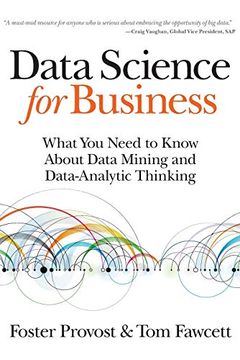
Data Science for Business
What You Need to Know about Data Mining and Data-Analytic Thinking
Explore the fundamental principles of data science with Data Science for Business. This book is written by experts Foster Provost and Tom Fawcett, and teaches readers the "data-analytic thinking" needed to extract valuable business insights from collected data. With the use of real-world examples, you'll learn how to improve communication between stakeholders and data scientists, as well as how to participate intelligently in data science projects. Discover how data science can support business decision-making and gain a competitive advantage.
Presentado en 22 artículos
Recomendado por
Kirk BorneDiscover the exciting world of statistics and its real-world applications in Naked Statistics. In this engaging book, Charles Wheelan simplifies complex concepts and shows us how data and statistics can be used to answer pressing questions, from cheating schools to rising autism rates. With insightful examples, including Schlitz Beer marketers and Let's Make a Deal, Wheelan brings statistics to life and strips away the technical details to focus on intuition. For those who struggled through Stats 101 or anyone curious about the power of data, Naked Statistics is a must-read.
Presentado en 22 artículos
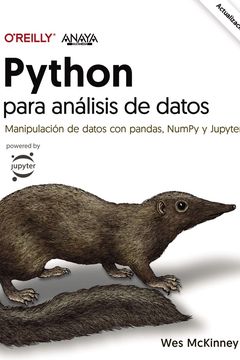
Python para análisis de datos
Data Wrangling with Pandas, NumPy, and IPython
Obtén el manual definitivo para manipular, procesar, limpiar y restringir conjuntos de datos en Python. Actualizado para Python 3.10 y pandas 1.4.0, esta tercera edición de Python para análisis de datos. Manipulación de datos con pandas, NyumPy y Jupyter está llena de casos prácticos, que permiten averiguar cómo resolver una amplia variedad de problemas de datos de una manera efectiva. Con su ayuda conocerás y aprenderás las versiones más recientes de pandas, NumPy, IPython y Jupyter.
Escrito por Wes McKinney, el creador del proyecto pandas, Python para análisis de datos es una introducción práctica y moderna a las herramientas de ciencia de datos que ofrece Python. Es ideal para analistas no versados en Python y para programadores que deseen ponerse al día en ciencia de datos y computación científica o ciencia computacional. GitHub alberga los archivos de datos empleados en el libro y otro material asociado.
Entre otras cosas, este libro
* Utilizar Jupyter Notebook y el shell de IPython para explorar datos. * Aprender funciones de NumPy básicas y avanzadas. * Iniciarse en el manejo de las herramientas de análisis de datos de la librería pandas. * Emplear herramientas flexibles para limpiar, transformar, combinar y remodelar datos. * Crear visualizaciones informativas con matplotlib. * Aplicar la función GroupBy de pandas para segmentar, desmenuzar y resumir conjuntos de datos. * Analizar y manipular series de datos temporales regulares e irregulares. * Aprender cómo resolver problemas reales de análisis de datos con ejemplos específicos y detallados.
Presentado en 21 artículos
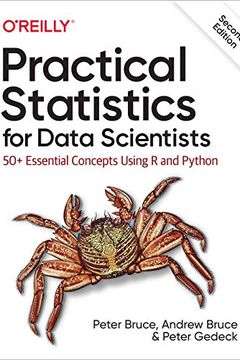
Practical Statistics for Data Scientists
50+ Essential Concepts Using R and Python
This book is a must-have for aspiring data scientists who lack formal statistical training. It explores statistical methods from a data science perspective and provides practical guidance on their application. The second edition includes comprehensive examples in Python and advice on avoiding their misuse. You'll learn all about exploratory data analysis, random sampling, experimental design, regression, and more. Plus, the book covers unsupervised learning methods for extracting meaning from unlabeled data. If you're familiar with R or Python and have some exposure to statistics, this accessible reference will bridge the gap for you.
Presentado en 21 artículos
Peter Norvig, Director de Investigación en Google, coautor de AIMA, uno de los libros de texto en IA más utilizados en el mundo: "Burkov ha acometido la muy util pero casi imposible y durísima tarea de reducir todo el aprendizaje automático a 100 páginas. Su éxito total al escoger los temas -tanto teóricos como prácticos- será de gran utilidad para los profesionales, y para el lector que es consciente de que están son las primeras 100 (en realidad 150 páginas) que leerá del tema, pero que no serán las últimas, proporciona una sólida introducción a la materia."
Aurélien Géron, Ingeniero Senior en IA, autor del bestseller Hands-On Machine Learning with Scikit-Learn and TensorFlow: "La amplitud de los temas que el libro cubre en solo 100 páginas (¡algunas más como extra!) es asombrosa. Burkov no duda en entrar en las fórmulas matemáticas, algo que en los libros cortos se suele evitar. Realmente me ha gustado como el autor explica los conceptos fundamentales en solo unas pocas palabras. El libro puede ser muy útil tanto a los principiantes en el campo, como a los más experimentados, que sin duda hallarán valor en una visión tan amplia del campo."
Karolis Urbonas, Jefe de Ciencia de Datos en Amazon: "Una gran introducción al aprendizaje automático por parte de un profesional de clase mundial."
Chao Han, VP, Jefe de I&D en Lucidworks: "Ojalá hubiera tenido un libro así cuando era un estudiante de estadística tratando de aprender sobre aprendizaje automático."
Sujeet Varakhedi, Jefe de Ingeniería en eBay: "El libro de Andriy hace un trabajo fantástico explicando los conceptos de manera concisa y a toda velocidad desde la primera página.''
Deepak Agarwal, VP de Inteligencia Artificial en LinkedIn: "Un libro maravilloso para los ingenieros que deseen incorporar el aprendizaje automático en su trabajo diario sin tener que gastar una cantidad enorme de tiempo.''
Vincent Pollet, Jefe de Investigación en Nuance: "Excelente lectura para comenzar con el aprendizaje automático.''
Gareth James, Professor of Data Sciences and Operations, co-author of the bestseller An Introduction to Statistical Learning, with Applications in R: "Este es un manual compacto de "cómo hacer ciencia de datos" y predigo que se convertirá en un recurso para académicos y profesionales por igual. Con poco más de 100 páginas, el libro es lo suficientemente corto como para leerlo de una sola vez. Sin embargo, a pesar de su extensión, cubre todos los enfoques principales de aprendizaje automático, que van desde la regresión lineal y la regresión logística, hasta las modernas máquinas de vectores de soporte, aprendizaje profundo, gradient boosting y bosques aleatorios. Tampoco faltan detalles sobre los diversos enfoques y el lector interesado puede obtener más información sobre cualquier método en particular a través de la innovadora wiki complementaria.
Presentado en 20 artículos
Recomendado por
Kirk BorneDeep Learning con Python by François Chollet
Pattern Recognition and Machine Learning by Christopher M. Bishop
Storytelling with Data by Cole Nussbaumer Knaflic
The Elements of Statistical Learning by Trevor Hastie
An Introduction to Statistical Learning by Gareth James, Daniela Witten, Trevor Hastie, Robert Tibshirani
R for Data Science by Hadley Wickham
Python Data Science Handbook by Jake Vanderplas
Inteligencia artificial by Stuart Russell
Doing Data Science by Cathy O'Neil
Machine Learning by Kevin P. Murphy
La señal y el ruido by Nate Silver
Machine Learning For Absolute Beginners by Oliver Theobald
Data Science For Dummies by Lillian Pierson
Programming Collective Intelligence by Segaran
Too Big to Ignore by Phil Simon
Big Data at Work by Thomas H. Davenport
Diseño de aplicaciones mediante el uso intensivo de datos by Martin Kleppmann
Todo el mundo miente by Seth Stephens-Davidowitz
Data Smart by John W. Foreman
Understanding Machine Learning by Shai Shalev-Shwartz
Armas de destrucción matemática by Cathy O'Neil
Python Machine Learning by Sebastian Raschka
Data Science and Big Data Analytics by Emc Education Services
Numsense! Data Science for the Layman by Annalyn Ng
Machine Learning by Tom M. Mitchell
Fundamentals of Machine Learning for Predictive Data Analytics by John D. Kelleher
Analítica predictiva (TÍTULOS ESPECIALES) by Eric Siegel
Practical Data Science with R by Nina Zumel
The Master Algorithm by Pedro Domingos
Big Data by Nathan Marz
Think Stats by Allen B. Downey
Big Data For Dummies by Judith S. Hurwitz
Vida 3.0 by Max Tegmark
Superinteligencia by Nick Bostrom
The Big Data-Driven Business by Russell Glass
The Data Science Handbook by Carl Shan
The Art of Data Science by Roger Peng
Machine Learning For Dummies by John Paul Mueller
Machine Learning for Hackers by Drew Conway
Machine Learning by Ethem Alpaydin
La Singularidad está cerca. Cuando los humanos transcendamos la biología by Ray Kurzweil
Reinforcement Learning by Richard S. Sutton
Make Your Own Neural Network by Tariq Rashid
R Cookbook by Paul Teetor
Hadoop by Tom White
Business unIntelligence by Barry Devlin
Machine Learning in Action by Peter Harrington
Analytics in a Big Data World by Bart Baesens
Big data en la práctica by Bernard Marr
Big Data, Data Mining, and Machine Learning by Jared Dean
Big Data For Beginners by Vince Reynolds
El arte de la estadística by David Spiegelhalter
Applied Predictive Modeling by Max Kuhn
Grokking Deep Learning by Andrew Trask
From Big Data to Big Profits by Russell Walker
Learning Spark by Holden Karau
Data Science Job by Przemek Chojecki
Data Architecture by W. H. Inmon
Artificial Intelligence by Melanie Mitchell
Machine Learning with R by Brett Lantz
Cómo crear una mente by Ray Kurzweil
Mining of Massive Datasets by Jure Leskovec
Natural Language Processing with Python by Steven Bird
The Human Face of Big Data by Rick Smolan
Máquinas predictivas by Ajay Agrawal
The Data Science Handbook by Field Cady
Automate This by Christopher Steiner
Data strategy by Bernard Marr
Machine Learning by Peter Flach
Human + Machine by Paul R. Daugherty
Inflection Point by Scott Stawski
Smart Cities by Anthony M. Townsend
Algorithms of Oppression by Safiya Noble
An Introduction to Probability Theory and Its Applications by William Feller
Data Mining by Ian H. Witten
Artificial Intelligence for Humans by Jeff Heaton
Numbersense by Kaiser Fung
La mujer invisible by Caroline Criado Perez
Automate the Boring Stuff with Python by Al Sweigart
Lean Analytics by Alistair Croll
Paradigms of Artificial Intelligence Programming by Peter Norvig
Generative Deep Learning by David Foster
Machine Learning with PyTorch and Scikit-Learn by Sebastian Raschka, Yuxi (Hayden) Liu, Vahid Mirjalili
Information Theory, Inference and Learning Algorithms by David J. C. MacKay
Think Python by Allen B. Downey
Python Cookbook by David Beazley
Advanced R by Hadley Wickham
Fundamentals of Data Visualization by Claus O. Wilke
Build a Career in Data Science by Emily Robinson, Jacqueline Nolis
Making Big Data Work for Your Business by Sudhi Sinha
